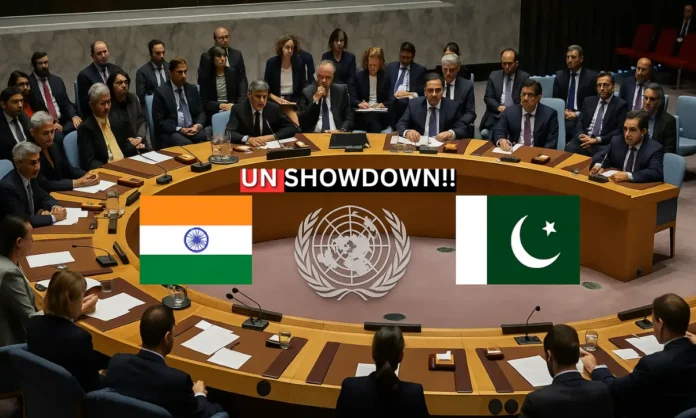SUMMARY
- The United Nations Security Council will hold closed consultations today over escalating India-Pakistan tensions following the Pahalgam terror attack.
- India suspended the Indus Waters Treaty and expelled Pakistani attaches, intensifying diplomatic standoffs after evidence of cross-border terror links.
- Pakistan seeks to rally international opinion at the UN while India counters by engaging non-permanent Security Council members to present its case.
A Region on Edge: India-Pakistan Tensions Flare After Pahalgam Attack
The United Nations Security Council (UNSC) will conduct a closed-door meeting today to discuss rising India-Pakistan tensions triggered by the deadly Pahalgam terror attack. Scheduled under the Greek Presidency, the session was called at Pakistan’s request, seeking to brief member nations on what it describes as “regional developments” — a move that India sees as an attempt to internationalize what it considers a bilateral issue.
India’s strong diplomatic measures after the Pahalgam tragedy, including suspension of the Indus Waters Treaty and the expulsion of Pakistani military personnel, have added urgency to the discussions. Meanwhile, Pakistan is framing the situation as a threat to regional peace, demanding a “neutral investigation” and warning against India’s alleged unilateral actions.
The keyword phrase “India Pakistan tensions Pahalgam attack” now encapsulates a broader diplomatic contest that could reshape regional alignments. As UNSC members prepare to deliberate, the stakes for South Asia’s stability — and the credibility of international forums like the UN — have rarely been higher.
Crucial day for Indian Diplomacy
— Shreya Upadhyaya (@ShreyaOpines) May 5, 2025
Pakistan has called for a closed-door #UNSC meet on #PahalgamTerrorAttack – will the world believe Pakistan's lies? pic.twitter.com/Us6QMESJmL
Pakistan’s Push at the UN: Seeking International Sympathy
- Pakistan formally requested closed-door UNSC consultations citing “threats to regional peace” after the Pahalgam terror attack.
- Islamabad is using the suspension of the Indus Waters Treaty as a central grievance in its diplomatic outreach.
- Pakistan’s UN envoy emphasized the “right” to request Council attention whenever regional peace is allegedly at risk.
- Pakistan denies responsibility for the Pahalgam attack and calls for a “neutral” probe.
- Islamabad warns that Indian restrictions on river waters could be considered an “act of war.”
Pakistan is leveraging the UN platform to internationalize its grievances against India in the aftermath of the Pahalgam terror attack. By invoking the suspension of the Indus Waters Treaty as a violation of longstanding bilateral norms, Islamabad seeks to portray India’s actions as escalatory and destabilizing.
Foreign Office statements and Pakistan’s UN envoy Asim Iftikhar Ahmad have underlined their position that recent Indian measures could imperil regional and global security. Islamabad’s narrative frames India as the aggressor while deflecting attention from accusations of cross-border terrorism — a delicate diplomatic balancing act on the global stage.
India’s Firm Response: Asserting Sovereignty and Mobilizing Allies
- India suspended the Indus Waters Treaty citing “sustained cross-border terrorism” linked to Pakistan.
- India expelled Pakistani military attaches and shut down the Attari land post to tighten diplomatic pressure.
- India reached out to eight non-permanent UNSC members to present its version of the events.
- New Delhi warned against Pakistan’s misuse of the UN platform for propaganda.
- Indian diplomats emphasized terrorism as the root cause of tensions, not India’s defensive measures.
India has adopted a muscular diplomatic posture after the Pahalgam attack, framing its actions as necessary countermeasures against a long-standing pattern of cross-border terrorism. New Delhi has been quick to communicate with UNSC non-permanent members, ensuring that its perspective is not drowned out by Pakistan’s diplomatic offensives.
India’s messaging strategy highlights that its suspension of the Indus Waters Treaty and other actions are proportional responses aimed at defending national security. Indian diplomats have also cautioned against allowing the UN to become a tool for Pakistani propaganda, emphasizing that the real threat to regional peace stems from terrorism, not defensive statecraft.
Global Reactions and UNSC Deliberations: Tightrope Diplomacy
- The Greek Presidency emphasized condemning terrorism while expressing concern over mounting tensions.
- Permanent members like the US and France have condemned the Pahalgam attack but avoided direct commentary on India’s actions.
- China remains a potential wild card, with its historical support for Pakistan complicating UNSC consensus.
- The closed consultation format suggests that members seek to manage tensions without public escalation.
- Diplomatic focus remains on de-escalating conflict while reaffirming global commitments against terrorism.
Global reactions to the Pahalgam incident and India-Pakistan tensions reflect a cautious balancing act. While key UNSC members like Greece, France, and the US have unequivocally condemned terrorism, they have stopped short of publicly endorsing or opposing India’s retaliatory measures.
The closed-door format of the consultations signals an intention to defuse tensions quietly rather than ignite a high-profile diplomatic showdown. Nevertheless, underlying divisions — especially China’s probable inclination to back Pakistan — mean that today’s UNSC session could quietly recalibrate international approaches to South Asian flashpoints. For now, tightrope diplomacy reigns supreme.
Final Reflection: Between Crossroads and Crosshairs
Today’s UNSC consultations are more than just another diplomatic event; they are a barometer of how the world responds to the intertwined threats of terrorism and interstate conflict. The “India Pakistan tensions Pahalgam attack” episode highlights that while terrorism still finds universal condemnation, the mechanisms for addressing state responses remain complicated and politically fraught.
India’s swift actions after the attack — from suspending treaties to mobilizing UNSC allies — show a government unwilling to play defense on global platforms. Pakistan’s push to portray India as the provocateur reveals its own urgency to control the international narrative. Meanwhile, the UNSC’s reluctance to engage in open sessions reveals an international community wary of escalating an already volatile situation.
As the crisis unfolds behind closed doors, one truth remains undeniable: in today’s multipolar world, narratives, alliances, and actions must all move in careful synchronization to prevent the spark of terrorism from igniting a far greater inferno.


